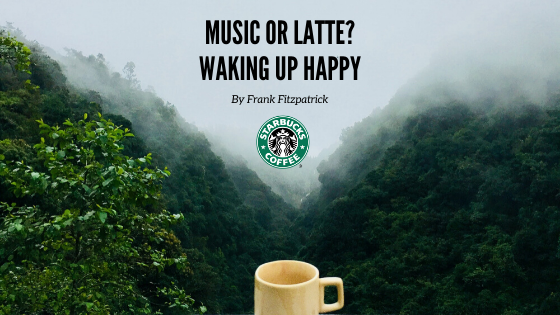Home Frank’s Blog Starbucks: Music or Latte? Prescription for Waking Up Happy
Starbucks: Music or Latte? Prescription for Waking Up Happy
Frank Fitzpatrick 10/25/2019

|
No time to read? Pick your language & press PLAY
Getting your Trinity Audio player ready...
|
We needn’t look far to see the growing proliferation of articles, products and books supporting the importance of that popular pastime – sleep. I started following this trend myself a few years ago when I became curious why my friend Arianna Huffington shifted her focus from running the Huffington Post to promoting the importance of sleep. What I learned: A good night’s sleep is essential to – if not the foundation of – our health, performance, and happiness.
So, I was naturally excited when I was recruited to serve as the Music and Health Expert earlier this year for collaboration between one of my client’s – Toronto-based Grayson Matthews, the Sid Lee agency and Starbucks, to share and validate ways we can optimize our mornings and wellbeing through the power of music. The idea of a campaign designed to promote music as a means to start our days out in a more inspired, healthier and happier state also struck a chord with our team of WHY Music Health and Science Experts.
As Dr. David Greenberg, Psychologist and Musicologist from the University of Cambridge cited,
“At first glance, the topic of wake-up music might seem trivial. But considering the well-established impact that sleep patterns have on mental health combined with the overwhelming scientific evidence that music enhances mood and attention, the right wake-up song can provide robust psychological benefits for people throughout the immediate morning hours and the remainder of the day.”

Even before we dive into scientific validation, it is clear that people find pleasure and benefit from listening to music. Americans have been known to spend more money on music than on prescription drugs and music consistently ranks among people’s top ten sources of pleasure. Over 90 percent of the top viewed videos in the history of YouTube are music, with over ten of those crossing the 3-billion view mark, and that number expected to double by 2020. Beyond its popularity, music has been used throughout history for its therapeutic benefits and documented in medical journals as far back as 2600BC. In more recent times, those therapeutic benefits have been confirmed by thousands of scientific studies. Recognizing this potential and looking to know more, the National Institute of Health recently established a $20 million fund to expand music and health research.
So why not tap into this incredible resource for mood and energy enhancement as we start our day?
When I dove in deeper, however, I was a little surprised to discover the lack of scientific research and attention given to one critically important part of the sleep process – waking up. Surely, there must be a better solution for starting our day than the traditional alarm clock and looking at emails.
WHY Music partner and Director of Neuroscience for Neuroscape at USCF, Dr. Ted Zantos, shared his expertise and sentiment,
“It is known that music can serve to reduce both subjective measures of anxiety and physiological measures of stress, so I am astonished that more attention has not been focused on using music to wake us up. Instead, people insist on using alarm clocks, which by definition, are alarming. Your first experience of the day should not be stressful because stress, especially chronic stress, contributes to a host of health problems.”
Studying the state of the waking brain is a little more complicated than studying sleep, so it does make some sense that this area has not been as well researched and documented. We already know, however, that music engages more areas of the human brain than any other stimuli, and that it has the power to shift our energy and psychological state in just a few minutes. The benefits that music and lyrics can have on our emotions and wellbeing are backed by real science. That makes music an ideal companion to help us wake up to a better day. To help validate this position, we drew from over 70 sources across multiple areas of health and science including medical research, music therapy, positive psychology, cognitive development, and neuroscience. Our hope is that our work might spark further research to explore and validate this incredible opportunity to optimize wellbeing and happiness.
Although much of the effect of music on our psychological and physiological wellbeing has to do with personal experience and preference, we were able to identify some key qualities that you might look for in musical selections to help you smoothly transition from a sleep state to a fully awake state, and start your day in a more positive and inspired mood. You can read those qualities on the list at the bottom of this article.
As part of the campaign, we also created a #MorningYes Wake Up theme song (performed by co-writer and producer Tyson Kuteyi) that embodies many of those key elements.
I invite you to listen to the Morning Yes theme song, or check out the creative guidelines below and choose your favorite song(s) to wake up to. Maybe it’s time to replace your alarm with a piece of music that eases you out of bed in a more gradual, healthier and inspiring fashion.
If you want to take it a step further, try creating your own morning playlist to bring more joy and balance to your morning routine. If you want an example to get you started, here is a sample of morning wake up playlist that I use on Spotify, which starts with the Morning Yes theme song.
We’d love to hear what you think and what you come up with.
Musical Prescription for Waking Up Happy (Creative Guidelines)
Positive Message:
Words affect our mindset and our mood. Our mind is more suggestive as we begin to wake up, so it can’t hurt to set ourselves up for some positive thinking. Once we are up and our minds are more active, we can reaffirm those good feelings with some positive lyrics rather than give in to our relentless voice of worry or get trapped too soon in a seemingly unending list of demands in our inbox. A song has the ability to amplify the emotional impact of messages expressed in its lyrics. Music we love with a message that uplifts us is a powerful way to start our day.
Gradual Build
Being abruptly woken from a deep sleep can contribute to a bad case of “sleep inertia” – that disorienting groggy sensation you might feel on a challenging morning. Unlike the jarring effect of the alarm clock, we can use music that helps us transition gently from our sleep into a more alert state. Songs that start more gradually and then build, like a sonic sunrise, will wake us more naturally and provide us with a more pleasant waking experience.
Steady Rhythm:
Our body naturally entrains to the rhythm of a steady beat. In addition to supporting positive emotions, music with an upbeat tempo (in the range of 100-130bpm) can engage the motor cortex of our brain and help us get up and start moving. Once we ease through the intro, a song with a good solid beat can help motivate us and contribute to a more alert state and good feelings. Some studies say our physiology has a preferred musical tempo, or resonant rhythm, around 120bpm, and others claim that an emphasis on the backbeat (beats 2 & 4) may also be more activating.
Tonality:
Just as steady upbeat tempos can support feelings of happiness, so can consonant tonalities and songs in major keys/modalities. While having certain reflective qualities, music in minor modes might be less effective at pulling us out of those morning blues. That said, these effects can differ as well with individual preference Waking up to music with too much dissonance, either harmonically or from the sounds in the mix, can trigger us to be fearful or anxious, which is not how we recommend you start your day.
Repetition:
Our brain likes patterns and familiarity. Those repeating musical hooks, familiar musical structures, and a great lyrical chorus can make a song stick in our memory and reaffirm the positive emotions expressed in the song. Repetition alone, however, is not the key: the brain experiences pleasure, expressed in part through the release of the neurochemical dopamine, both when its expectations are fulfilled and when they are slightly violated. This spice of musical variety, lightly sprinkled among those expected musical payoffs, can add to the pleasure we feel when listening to a great piece of music.
Music We Love:
Music preference is one of the key indicators of how we might respond to a piece of music. While a new piece of music, like the first listen of a well-written soundtrack to a film, can help shape our emotions and shift our energy to a more desired state, songs we already know and love (even a favorite genre or artist) can bring back stored memories, positive feelings, and associations. The more we listen to a piece of music, and the more we emotionally connect to it, the more it engrains into our deep memory and more quickly it triggers those positive feelings when we hear it again.
LISTEN to “Morning Yes” theme song and check out a sample of Wake Up music playlist on SPOTIFY.
The “Morning Yes” theme song was performed and Produced by Tyson Kuteyi and written by Tyson Kuteyi and Frank Fitzpatrick
WHY Music:
Founded by award-winning music producer and music and health expert Frank Fitzpatrick, WHY Music is a global initiative helping people unleash the power of music to transform their life and the world. The Health & Science Advisory Team includes neuroscientists, doctors, psychologists, researchers and music therapists committed to helping people live healthier, happier lives through music. Contributing to the Wake-Up Song initiative were Dr. Theodore Zanto, Dr. Nicholas Bazan, MD, Helen Dolas, MT-BC, and Dr. David Greenberg.
More at WHYMusicCampaign.com
••••
About the Author
Frank Fitzpatrick is a Creative Visioneer, Engagement Expert and High-Performance Coach on the Faculty of Singularity University’s Exponential Medicine.
To connect, go to FrankFitzpatrick.com
To learn more about working 1-on1 with Frank, go to BeyondPerformance.Life
Related Articles
HOPE: A Power Tool for Leadership & Self-Mastery
Sleeping Giant: Welcome to the Next Pandemic
I’m here to help YOU create a better world, inside and out.
Contact Me© 2025 Frank Fitzpatrick Website by AllHereIndia












